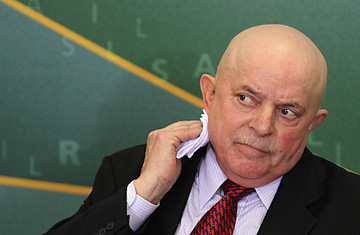
Brazil's former President Luiz Inacio Lula da Silva, Jan. 24, 2012.
Former Brazilian President Luiz Inácio Lula da Silva has been his nation's dominant, larger-than-life political figure for a decade. So when he retired from public life to treat throat cancer last year, his silence resonated loudly with friends and enemies alike. Now, however, Lula is back — but at the center of a new intrigue over an old but lingering scandal.
Lula's reappearance in the lead-up to a controversial court case involving the wide-ranging 2005 corruption drama that tarnished his first presidential term has confirmed his role as the eminence grise of Brazilian politics. But allegations that he tried to convince a Supreme Court judge to delay the trial of members of his Workers' Party (PT) until after this coming October's municipal elections have wider and perhaps uglier implications for a man widely recognized as one of the most popular and important leaders in Brazil's history. "Lula wants to be remembered as a president who did a lot of good things, so he is very zealously trying to defend his [two terms] in office," says David Fleischer, a political scientist in the capital Brasília. "But I think he has put his legacy in jeopardy because of this."
The new scandal centers around the upcoming trial of 38 people accused of participating in the mensalão, an extensive vote-buying ring allegedly run from inside Planalto, the Brasília presidential palace, to ensure Congressional support during Lula's first term in office from 2003 to 2007. The government supposedly took cash from the advertising budgets of state-run companies and used it to make regular, under-the-table payments to congressional deputies who pushed through key legislation in return.
However, although mountains of evidence and scores of witnesses were produced in front of a parliamentary enquiry that transfixed the nation, the mensalão scheme (a reference to the "monthly" payments allegedly made to deputies) was never conclusively proven. Lula was comfortably re-elected in 2006 and has always denied any wrongdoing. Nevertheless, several of his closest allies accused of operating the graft were either removed from office or resigned before they could be impeached. Lula's first chief of staff, José Dirceu, as well as the PT's treasurer and president, were among those forced out, along with several senior PT deputies.
What's more, the evidence unearthed by police and congressional investigators was enough for the public prosecutor's office to allege "a criminal plan to buy votes inside Congress." It moved ahead with prosecutions, but it is only now that charges ranging from racketeering to tax evasion to money laundering are finally being brought. There is some urgency to hear the accusations because the statute of limitations is close to expiring in some instances. Many PT leaders fear that if the evidence is heard in advance of local elections it could cost the party at the polls.
Among the anxious PT bosses is Lula, according to Veja, a popular Brazilian newsmagazine that is sharply critical of the former President and the PT. Veja reported last weekend that Lula met with Supreme Court Justice Gilmar Mendes in Brasília last month and hinted that it would be best if the trial of the 38 was delayed. (Under Brazilian law, such cases involving politicians are tried in front of the Supreme Court's 11 justices.) In the magazine report, Mendes says Lula told the judge that if he agreed to delay the trial, the PT would ensure Mendes did not become a target in another highly charged corruption investigation under way in Congress. Mendes felt aggrieved and decided to make the overtures known. "I was perplexed with the president's conduct and misplaces insinuations," Mendes told Veja.
The former president, who left office December 31, 2010, with record popularity ratings, acknowledges that he met with Mendes but calls the Veja report "untrue," declaring himself "indignant" at its contents. Lula "never interfered or tried to interfere in Supreme Court or Attorney General's Office decisions involving the so-called mensalão or in any other affair that came under the auspices of the judiciary or the public prosecutor's office in the eight years he was President of the Republic," his office said in a statement this week.
Whatever actually went down in the meeting may end up being irrelevant. Lula is widely perceived as the loser for simply having allegedly overreached in a way that stands to sully his otherwise extraordinary political legacy. The winner, meanwhile, may well be a judicial branch that, for all its sluggish and elitist reputation, refused to be cowed by Lula's towering figure.
What happens now depends on two main factors: Lula's behavior and the court's trial rulings. President Dilma Rousseff, Lula's last chief of staff and his hand-picked successor, can't have been happy with her former mentor's interference — and if Lula continues to try and exert a sly influence in Brasília, their close relationship could sour. That in turn could have implications for Rousseff, who had been happy to let Lula run interference in the political back rooms where he is still deeply respected.
At the same time, the trial could have a pronounced effect not only on the lives of the 38 people standing in the dock but on the future of of Brazil's relatively young democracy. "This could be a critical junction in Brazilian history," said Carlos Pereira, a political scientist at the Getulio Vargas Foundation in Rio de Janeiro who has written about the case. "It will decide which road we go down: If [the accused] are not punished then it sends a message that people can do what they want and get away with it, but if they are punished it is a sign to other politicians that such behavior will not be tolerated." Whether or not, local elections are coming up.
